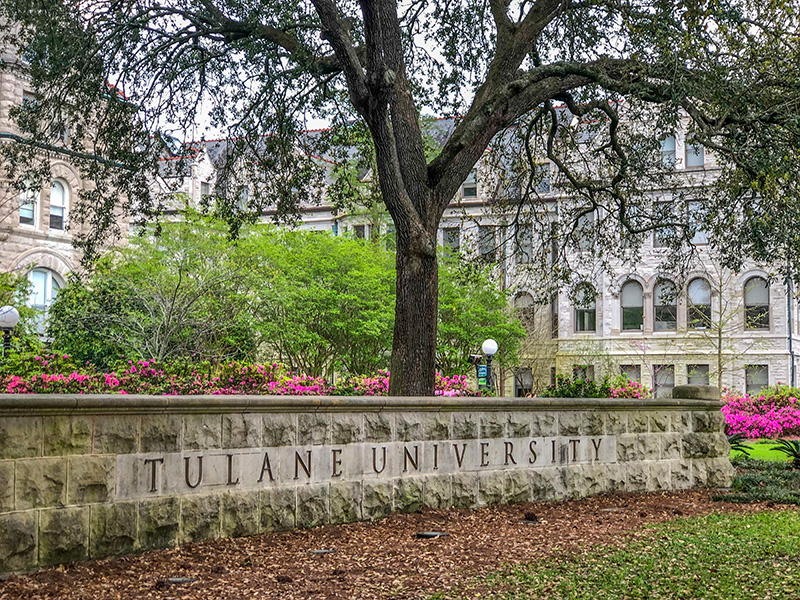Lepage Center to award $100,000 in research grants to Tulane faculty and students studying costs of racial inequity

The Albert Lepage Center for Entrepreneurship and Innovation at Tulane University’s A. B. Freeman School of Business is collaborating with researchers from across the university to host a three-day workshop aimed at counting the costs of racial inequity in the United States.
“Count the Costs Research Weekend,” which takes place March 12 to 14, will bring together scholars from many academic disciplines to develop research proposals that investigate the barriers that BIPOC (Black, Indigenous and People of Color) experience in our society, the economic impact of those barriers and viable approaches to addressing them. Participants can then use their proposals to apply for one of five research grants to be awarded from a funding pool of $100,000. For the health and safety of participants, the event will take place virtually.
“Count the Costs Research Weekend” was motivated by findings from the 2020 Greater New Orleans Startup Report. For the past two years, the Lepage Center has surveyed more than 200 small businesses to gauge the region’s economic and entrepreneurial health. The 2020 survey found significant racial inequities between BIPOC-owned businesses and white-owned businesses in access to funding as well as outcomes such as revenue and profit margins.
“These insights come directly from our own startup community,” said Rob Lalka, executive director of the Lepage Center. “When we see such inequities along racial lines, we’re witnessing historical and moral injustices — we know that. But there is more to the data, which we need to better understand. What would our GDP be, if we had invested more equitably? What innovations are we missing out on? We want to find out the answers to those questions, and many others like them, because that knowledge is the first step towards shedding light on entrepreneurial solutions the data tell us we’ve ignored, and which could create a better economy for us all.”
Academic partners for the event include the Murphy Institute, the Cowen Institute, the Taylor Center for Social Innovation, the Center for Public Service, the Mary Amelia Center for Women’s Health Equity Research and New Orleans Book Festival at Tulane University.
“This is such a complex and multifaceted problem, which is why we’re partnering on this initiative to understand inequities from a variety of perspectives, to determine what we have been leaving on the table and how much untapped value we can unlock — for better business, childcare, healthcare, science, and so much more — by correcting these gaps,” said Cheryl Landrieu, co-chair of New Orleans Book Festival at Tulane University.
In addition to the above centers and institutes, all schools within Tulane have committed to participate in ways ranging from sourcing speakers to sharing resources, making “Count the Costs of Racial Inequity” truly a university-wide event. In the past, the Lepage Center has supported faculty research from around the university by awarding a $80,000 grant pool to its Lepage Faculty Fellows, who hail from the School of Law and School of Science and Engineering, in addition to the business school.
“This university-wide initiative supports Tulane’s vision of building a more just and equitable world both with the knowledge that will come from the research and the impact of the solutions,” said Anneliese Singh, Tulane University chief diversity officer.
The Lepage Center is convening a group of community partners to participate to ensure their perspectives are being incorporated into this work. The Lepage Center today announced that speakers from Whitney Plantation and the Louisiana Chamber of Commerce Foundation (LCCF) will speak on Day One, in addition to other guest speakers to be announced in the coming weeks. David St. Etienne, president of the LCCF will address the researchers during the weekend to lay out the issues he has grappled with during his career in economic development.
“Louisiana spends hundreds of millions of dollars on incarceration and receives little in return. Just imagine if those resources were invested in education as an alternative intervention; we could create a larger state economy for everyone,” said St. Etienne. “Black residents make up 32% of our population, and if we truly want our state to thrive, we cannot leave them out of opportunities. Black business ownership is a path to wealth and job creation.”
The panel of evaluators for the weekend include Anneliese Singh, Tulane University chief diversity officer; Thomas LaVeist, dean of Tulane School of Public Health and Tropical Medicine; Jasmijn Bol, professor of accounting at the A. B. Freeman School of Business; Ted Fee, professor and senior associate dean at the A.B. Freeman School of Business; and Margaret Montgomery-Richard, former board chair of the New Orleans Regional Black Chamber of Commerce.
“Research Weekend is an important way for the business school to work with scholars from across the university toward our shared equity, diversity and inclusion goals,” said Ira Solomon, Freeman School dean. “It is our hope and expectation that the research initiatives that emerge from this weekend will inform economic development and support entrepreneurs in our community.”
Applications for participation are now open and will be evaluated on a rolling basis until Monday, March 8. Selected teams will be notified no later than Wednesday, March 10.
Interested teams can find more information at https://freeman.tulane.edu/content/lepage-center-research-weekend and apply here: https://tulane.co1.qualtrics.com/jfe/form/SV_9Gez0dZwKYob37w and those interested in learning more should contact Rosalind Butler at rbutler4@tulane.edu.
Other Related Articles
- The Times: How Elon Musk dismantled USAid — and what it really means
- The Times-Picayune: Louisiana has struggled to become a high-tech hub. Can it become a key outpost instead?
- TechTarget: Venture capital ties could shift U.S. government policies
- The Hill: TikTok buyers line up as Trump, China signal openness to deal
- The Seattle Times: Once dubbed a ‘woke’ billionaire, Jeff Bezos changes his tune on Donald Trump
